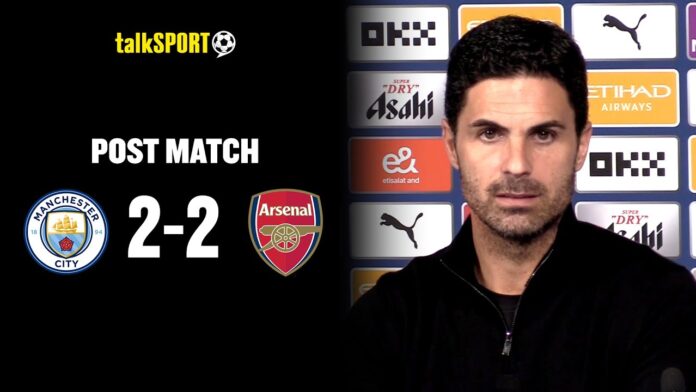Arsenal manager criticizes referee Michael Oliver’s inconsistent officiating after Leandro Trossard is sent off during a contentious match
Arsenal manager Mikel Arteta expressed his outrage following the controversial red card shown to Leandro Trossard in the Gunners’ 2-2 draw against Manchester City at the Etihad Stadium. The match, marked by intense competition and critical moments, took a significant turn when Trossard received a second yellow card just before halftime.
The incident unfolded when Trossard, who had already been cautioned for a foul, was penalized again for a tackle on Bernardo Silva. In a moment of frustration, he kicked the ball away, earning him the second booking. Arteta, watching from the sidelines, found the decision particularly disheartening given that City’s Jeremy Doku had evaded punishment for a similar act earlier in the match.
“We were leading 2-1 and then faced two incidents, one of which was very similar but had a drastically different outcome,” Arteta lamented. “It forced us into a game that nobody wants to watch.”
The manager’s frustration was compounded by the fact that this was not the first time Arsenal had experienced a harsh sanction for kicking the ball away. Earlier in the season, Declan Rice had been sent off for the same infraction against Brighton. Arteta noted the alarming trend of such red cards in the Premier League, calling it “really worrying” for the integrity of the competition.
Arteta’s concerns extended beyond the Trossard incident. He pointed out the inconsistencies in officiating, questioning the timing of referee Michael Oliver’s decisions. “It was less than a second between the whistle and Trossard kicking the ball. Doku’s incident was over a second. That’s a significant difference,” he argued.
Despite being reduced to ten men, Arsenal fought valiantly to maintain their lead until the dying moments of the match, when John Stones scored a stoppage-time equalizer for City. Arteta praised his team’s resilience but admitted that playing with ten men made their task “impossible.”
“It’s already hard enough against 11 players, but it becomes impossible when you have to defend with six players in the box repeatedly,” he stated, reflecting on the daunting challenge his team faced after Trossard’s dismissal.
Analysis:
Political: The fallout from Trossard’s red card raises important discussions about the governance of officiating in football. As debates about consistency and fairness in refereeing practices grow, stakeholders from clubs to fans are increasingly calling for transparency and accountability in how decisions are made during matches. This incident could prompt the Premier League to reassess its policies on refereeing standards, particularly in high-stakes matches.
Social: Arteta’s frustrations highlight a broader social commentary on the pressures faced by players and managers in elite football. The emotional investment in matches and the high stakes can lead to heated reactions, reflecting the intense passion that drives both players and supporters. Furthermore, the inconsistency in officiating affects the integrity of the game and fans’ trust in its fairness, igniting discussions about sportsmanship and fair play.
Gender: The dialogue surrounding officiating consistency is crucial not only in men’s football but also as women’s football gains prominence. As the women’s game attracts more attention and investment, the standards of officiating will also come under scrutiny. Advocating for fair treatment and consistency in decision-making is vital for the integrity of all levels of the sport, reinforcing the importance of equality in football.
Economic: The financial implications of decisions like Trossard’s red card extend beyond the immediate match. Teams rely on player availability for performance and revenue generation. A red card can lead to lost points, impacting league standings and future earnings from sponsorship and broadcasting rights. This incident underlines how officiating can have far-reaching economic consequences, affecting club finances and the overall landscape of the Premier League.
